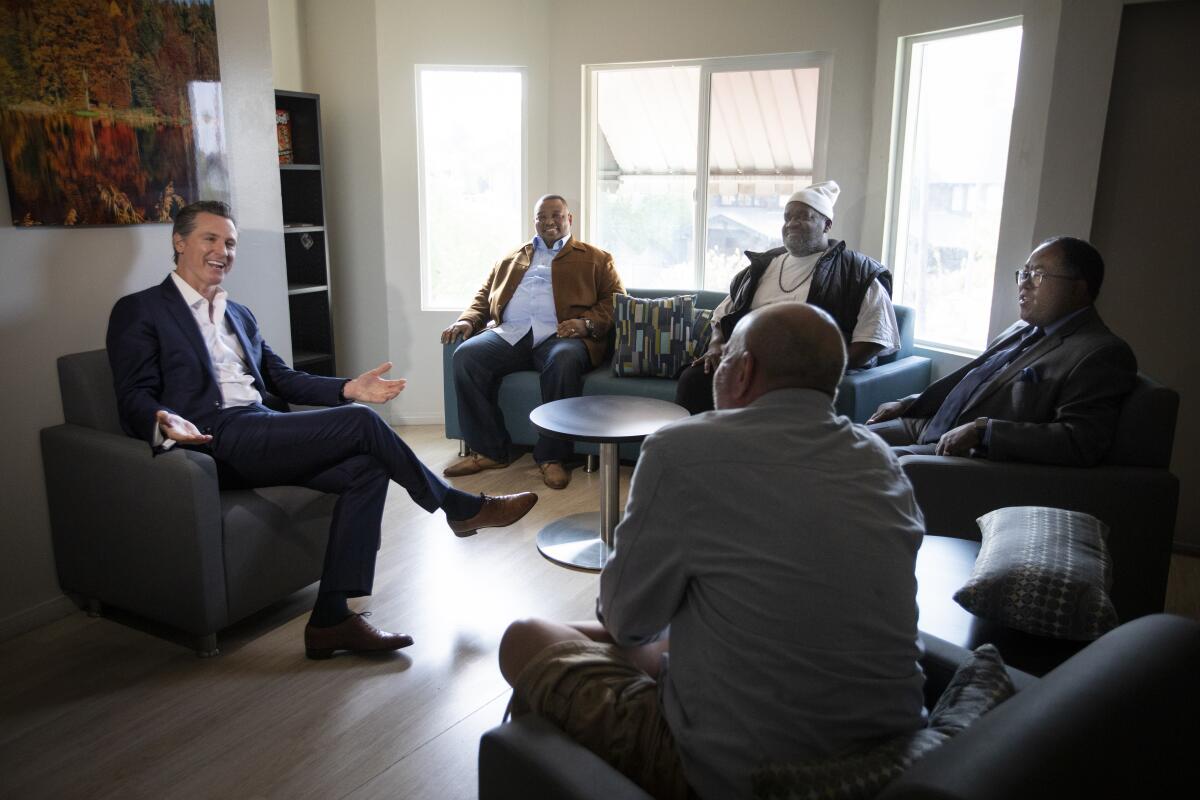Newsom can’t afford to ignore homelessness. It’s the top issue with voters

- Share via
SACRAMENTO — The main reason California politicians are moving swiftly to remove homeless people from the streets is simple: Homelessness has become the public’s No. 1 state concern.
That’s the way it’s supposed to work, after all. It’s how the Founders set it up. It’s in the best interests of politicians protecting their job security to represent the interests of voters who elected them.
A poll released Wednesday by the Public Policy Institute of California shows that homelessness has become the top state issue for voters. This subject used to register only a low-level blip on the public’s list of concerns.
Because homelessness has become such a hot topic, politicians are being inspired to confront the issue more aggressively than ever before.
All this week, Gov. Gavin Newsom has stumped the state promoting a sweeping homelessness plan he unveiled in his proposed new state budget. That’s precisely what a governor should do: announce a major proposal in the Capitol, then venture out and try to sell it to the public around the state, lighting a fire under the Legislature as the voters are under the politicians.
Meanwhile, a homelessness advisory task force created by the governor unveiled its separate substantive plan Monday. Its main feature is a proposed state constitutional amendment that would require local governments to hop to it on homelessness. No longer would confronting the problem be an option. It would be mandatory.
“We’ve tried moral persuasion. We’ve tried economic incentives,” said Sacramento Mayor Darrell Steinberg, who co-chairs the task force along with L.A. County Supervisor Mark Ridley-Thomas. “But all of it’s optional. Why should this be optional? It shouldn’t be. It mustn’t be. Thousands of people are dying on the streets and people are telling us this is a priority.”
Yes, they emphatically are.
The nonpartisan PPIC asked likely voters which one issue they thought was “the most important for the governor and state Legislature to work on in 2020.” The top choice was homelessness. Nothing else came close.
The results: homelessness 23%, housing costs and availability 11%, environment and climate change 9%, immigration 8%, jobs and the economy 7%. And K-12 schools — a traditional concern — didn’t even register.
L.A. County residents in particular desired a push on homelessness.
Public frustration over homelessness has flared in the last year. Last January, only 7% of likely voters in a PPIC poll named homelessness as the state’s most important issue. Back then, the biggest concern was immigration, followed by education.
PPIC President Mark Baldassare pointed to another survey result that illustrates the demand by voters that politicians focus on homelessness. Asked which program “should have the highest priority” for state spending, health and human services edged out K-12 schools 40% to 38%. That was previously unimaginable.
Baldassare theorizes that voters now equate health and human services with helping people living on the street.
Last January, just 30% of likely voters favored making HHS the top spending priority. And in 2015, only 19% did.
So what has happened to propel homelessness into the No. 1 California concern?
“Every place that people go, they’re seeing homelessness now,” Baldassare says. “It’s not just something in Los Angeles or San Francisco. It’s very evident across the state. It’s maybe the most disturbing element of the housing crisis.
“People don’t like to see other people suffering,” the pollster continues. “On some level, people think everyone who lives in California should have shelter, a roof over their heads.
“There’s an element of shock and it’s disturbing. Some of these people are scary. It can be threatening and frightening. It can be sad and depressing. Many Californians feel like they can’t look the other way any longer.”
Steinberg, a former state Senate leader, is one politician who didn’t need poll results to motivate him to fight homelessness, particularly when it results from mental illness. He has been a mental health crusader for decades.
In 2004, Steinberg wrote the “millionaires’ tax” ballot initiative that added a 1% income tax rate for people with million-dollar earnings. The money was designated for mental health treatment. Now he and Newsom want to overhaul that law to spend more of the tax revenue on treating mentally ill homeless people.
Steinberg says homelessness “is the most visible and terrible manifestation, other than suicide, of mental suffering. And people are seeing the suffering.”
“It has taken a long time to bring this into public consciousness,” Steinberg continues. “But the seeds have always been there because everyone can tell a story about a family member or friend who has suffered. People can relate. They’re frustrated and tired of it.”
People also want back their sidewalks and parks freed of homeless encampments.
“The public is fed up — completely fed up,” says Ridley-Thomas, who’s termed out as supervisor and is running for L.A. City Council. “It’s variously motivated: self interest. Disgust and anger. Altruism and high mindedness…. People on the streets are unsafe, unhealthy and uncivil.
“And the public is saying, ‘Wait a minute. This is America. This is L.A. This is California, the fifth-largest economy in the world. And it’s defined by squalor.’”
Credit the governor and his task force for proposing plans that don’t just call for more tax money. Newsom wants to spend an additional $1.4 billion for shelters and healthcare, but he also insists on improving how the services are delivered and the money is spent.
One encouraging thing: This is not a polarizing, partisan issue among voters. Democrats, independents and — especially — Republicans all agree it’s the No. 1 issue facing California.
More to Read
Sign up for Essential California
The most important California stories and recommendations in your inbox every morning.
You may occasionally receive promotional content from the Los Angeles Times.














